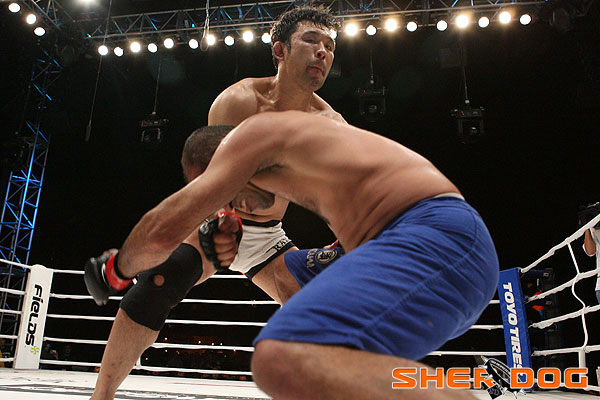MMA’s Mount Rushmore
Pride’s Frontman

Kazushi Sakuraba helped put Pride Fighting Championships on the
map. | Photo: Dave Mandel/Sherdog.com
Kazushi Sakuraba
Nationality: Japanese
Discipline: Catch Wrestling
Years Active: 1996-2011
Record: 26-16-1
In order for Pride to evolve into the second most successful organization in MMA history, the company needed to create a native drawing card. Nobuhiko Takada was the closest thing the promotion had to a money player in the early days, but he was not a real fighter. Pride could only coast for so long rotating between worked Takada wins and real Takada losses.
It was from within that setting that one of MMA’s unlikeliest superstars rose. Sakuraba was a preliminary professional wrestler with little fan appeal who had trained in Takada’s dojo. The thing Sakuraba had going for him was that he could fight. A gifted submission grappler, Sakuraba spent the early days of Pride submitting highly talented competition from around the world.
Advertisement
In a little more than a year, Sakuraba defeated four different Gracies. The crowning jewel of the series was the 90-minute epic match in which he handed Royce his first career loss. It catapulted Sakuraba into a status as Pride’s top star and celebrated national figure. Sakuraba’s popularity came not only from his in ring ability but his playful, experimental brand of entertainment-oriented fighting.
Unfortunately for Sakuraba, he was willing to take on all comers. As a result, he spent the next 12 years taking on elite fighters, many of whom outweighed him by dozens and dozens of pounds. Even in defeat, Sakuraba was taking MMA to new popularity levels. His main event against Wanderlei Silva at Pride 17 drew more than 50,000 fans to the Tokyo Dome, setting an MMA attendance record. Less than a year later, his headliner against Mirko “Cro Cop” Filipovic drew more than 90,000 to Tokyo National Stadium, establishing a new mark.
The toll of a series of tough fights combined with little time to recuperate eventually resulted in Sakuraba’s deterioration and left us with a fighter who could barely move. Like a shot boxer of another era, Sakuraba’s late career was downright sad. He was trotted out for fight after fight well past the point he should have still been competing, and he struggled against opponents he could have tapped in minutes just a few years earlier.
Some fans who did not see Sakuraba in his prime may doubt his greatness, but those of us who saw him at his best can attest to it. At his peak, Sakuraba was something special as a fighter and as an architect of MMA’s growth. MMA would look a lot different if it were not for “The Gracie Hunter.” Meanwhile, we are left to wonder how different Sakuraba would look today if not for the handlers who exploited him so shamelessly.
Continue Reading » Stoic Assassin
Related Articles







